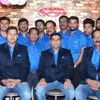In an era of lithium ion, this Faizabad entrepreneur is eyeing Rs 100 Cr from lead acid batteries.
Faizabad-based Highflow Industries makes lead-acid batteries for inverters, solar panels, e-rickshaws, two-wheelers, cars, tractors, heavy vehicles, and more. Here's how it is betting big on lead acid battery technology when lithium ion has become the norm.
Long before the Electric Vehicle (EV) revolution and the advent of lithium ion batteries, Om Prakash Jaiswal used to sell rubber containers and plates to Indian battery companies.
His small business, Om Engineering Works was started in 1987. It operated out of a shop in Faizabad, Uttar Pradesh.
With the passing years, Om Prakash felt there was a big opportunity in producing batteries. So in 2000, the company started making lead acid batteries, and five years later, began smelting and recycling them. The batteries found applications in household electronics, solar devices, and automobiles.
His son Sumit Jaiswal (34), who has since taken over, says:
"We initially had a capacity of making 20 batteries a day. After breakthroughs in e-rickshaw and solar battery manufacturing, we grew at a fast rate, propelling us to our present capacity of three hundred batteries per day."
In 2014, the company changed its name to Highflow Industries.
Today, it makes lead acid batteries for inverters, solar panels, e-rickshaws, two wheelers, cars, tractors, heavy vehicles, and more.
Sumit says he's invested Rs 10 crore in the business so far, and he claims an annual revenue of Rs 25 crore.

Sumit Jaiswal, Founder, Highflow Industries
Why lead acid?
Lithium ion batteries are trending. The lithium-ion battery market in India is estimated to grow at a CAGR of 34.8 percent between 2019 and 2024, says data from market research firm Mordor Intelligence.
Due to lithium ion's rising popularity and its advantages over lead acid batteries, there is a common perception that lead acid battery technology is outdated.
Lead acid batteries have lower capacities, depths of discharge, efficiencies and lifespans than their lithium ion counterparts. However, lead acid batteries are significantly cheaper than lithium ion.
While the industry grapples with lowering lithium ion battery costs, lead acid continues to find popular use in small, off-grid storage systems that do not require expensive energy storage infrastructure.
The market for lead acid batteries in India is projected to grow at a CAGR of over nine percent from 2019 to 2024, according to Research and Markets data.
Highflow seeks to tap into this growth for lead acid batteries and reach revenue of Rs 100 crore this year.
"There is a huge market potential with the advent of solar and e-rickshaw segments. This is because they help cut down air pollution and reduce overall carbon emissions. The batteries have always played a vital role in this. We are quite unique in this space since we use automation to minimise manual errors. Apart from this, efficient material handling plays a vital role in our achievements," Sumit says.

Highflow's automotive battery
Scaling up
Lithium ion is yet to completely replace lead acid batteries and render them obsolete.
India remains reliant on lithium ion cell imports from China and other South Asian countries such as Taiwan and South Korea.
The world's supply of cobalt and nickel, two metals used in lithium ion batteries, is also being strained by the rising popularity of the battery technology. Owing to this, cobalt and nickel prices have risen significantly.
Despite the odds, the number of applications for lithium ion is growing rapidly. Smartphones, laptops, other consumer electronics, power drills, energy storage, and other industrial applications all feature lithium ion batteries.
Sumit admits he is in the process of fully understanding lithium ion and how Highflow could venture into it.
Targeting expansion by adopting new technologies, he says:
"It’s a steep ride and if one stops expanding, they could fail. It's important to keep reading and learning about new technologies. They have the potential to grow or destroy any industry."
He adds that lithium ion is the "latest thing to invest in", and identifies staying updated with the latest technology as a key challenge for Highflow.
"We don't want to be left behind," he says.
His plan for expansion is targetting new distribution channels to acquire more customers.
He adds, "Government schemes like capital subsidies will help industries such as ours to invest further in their system and keep them motivated. Also, I want to continue hiring good and trained professionals from bigger industries. This is because I believe that a person has limited knowledge, and without different perspectives, he/she can’t help the organisation grow."
(This story is published in partnership with the MSME Ministry to showcase success stories of SMEs)








